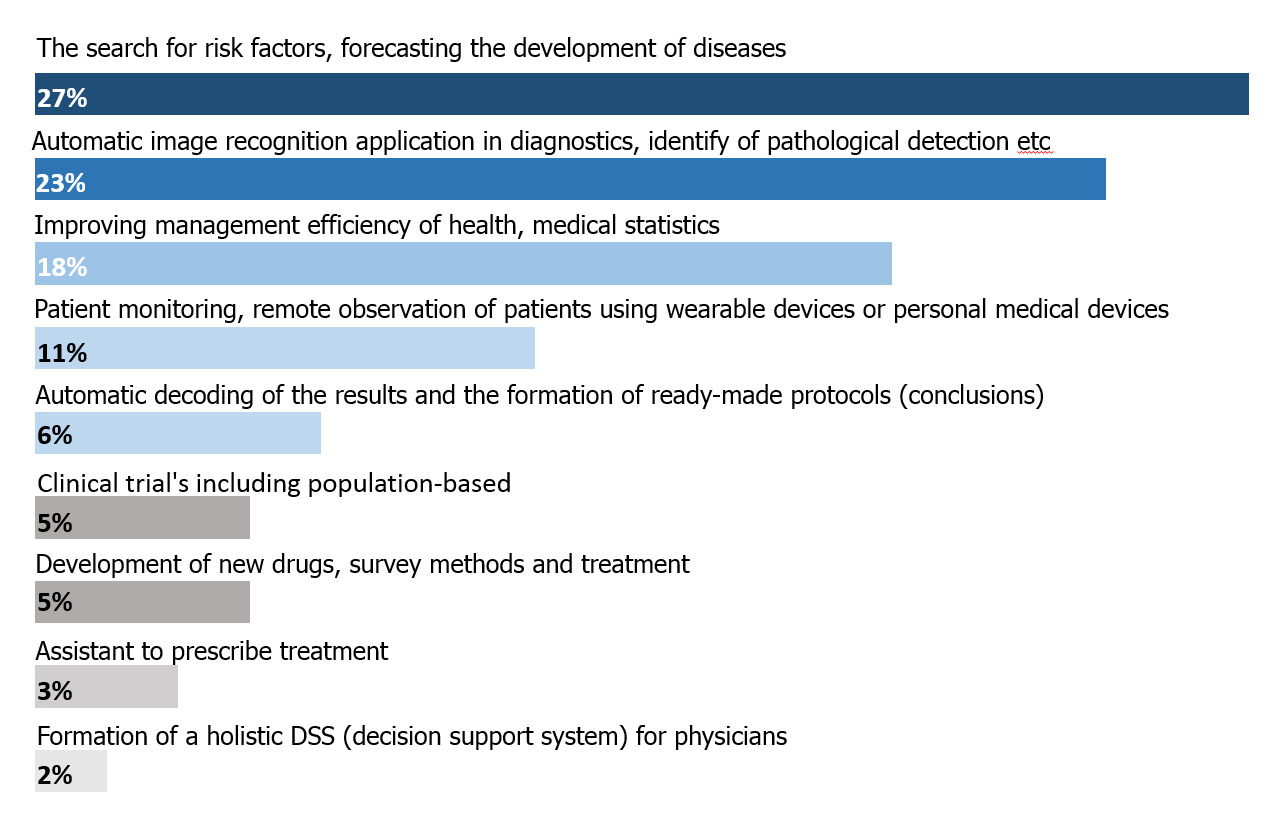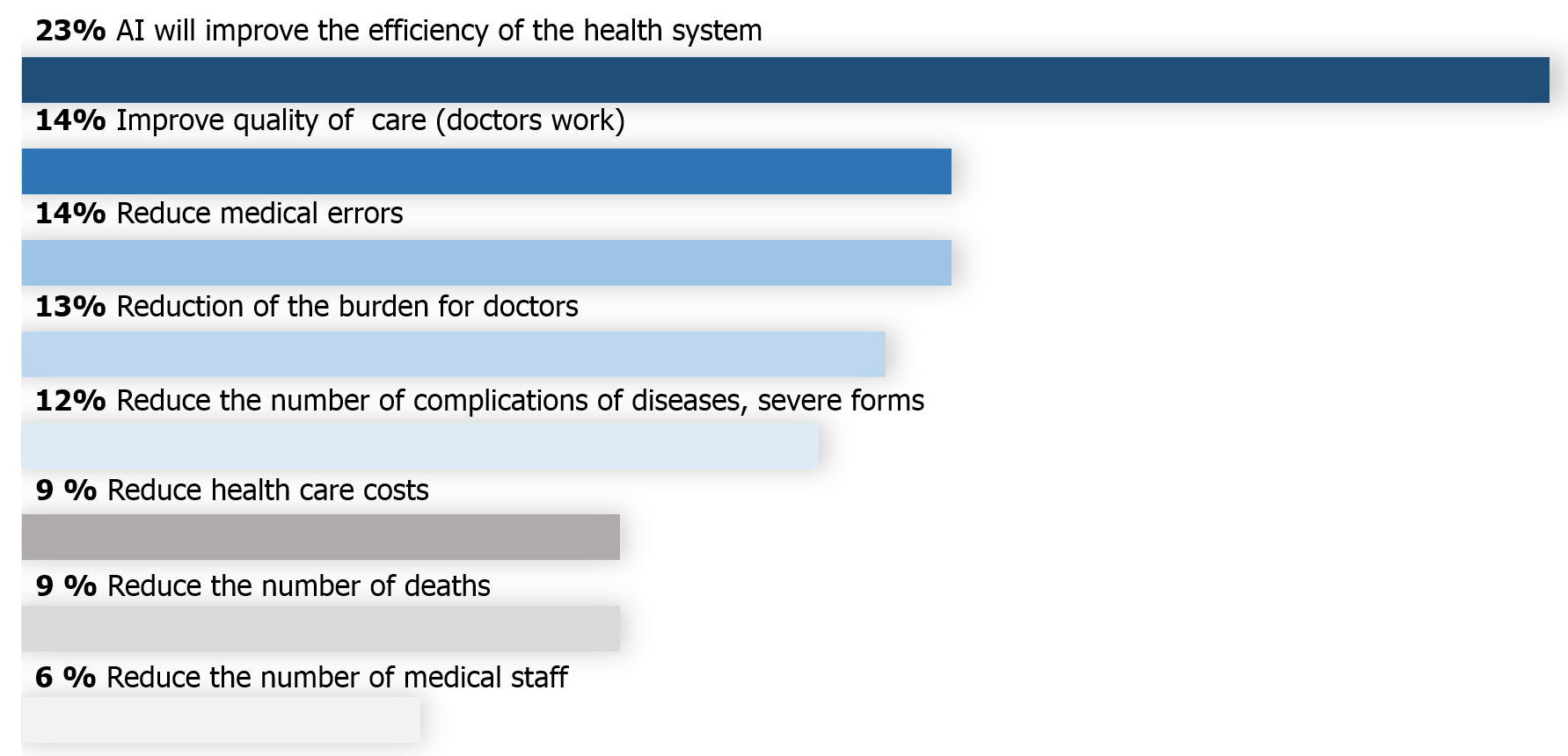
Although the AI pilot projects are still rare, the vast majority of Russians healthcare leaders are aware of the benefits and opportunities in artificial intelligence. Country's leadership is making great efforts to change that and promote AI innovation.
The Ministry of Health of the Russian Federation in cooperation with the Higher School of Public Administration held the first part of the training program "Chief Digital Transformation Officer"in Healthcare" in Moscow, June 2019.
Formation of competencies of healthcare managers in the field of digital health, including artificial intelligence, big data, data management, processes and project management, etc. is the main goal of this training.
The program was opened by Elena Boyko, Deputy Minister of Нealth of Russia and Maria Shklyaruk, CEO of Center for Advanced Governance, RANEPA Digital Transformation Leadership Training Centre.
"This course is a great opportunity to exchange information, thoughts, ideas among themselves and learn from each other" Maria Shklyaruk said.
"Our team had the objective to tell the regional healthcare managers about artificial intelligence, management process and big data. Also we revealed modern approaches to management and organization of work on the example of real projects. We are confident this will help the Federal Subjects of Russia to launch effective processes of digital transformation of the public health system. it will contribute to the implementation of strategic government programs, such as the national project "Health", — said Alexander Gusev, the Program director of the course, member of the expert Council of the Ministry of Health on the use of information and communication technologies in health.
Before the course began, the organizers conducted a survey of the students about artificial intelligence the prospects for the use of this technology in medicine and healthcare.
Ninety percent of sixty four respondents are decision-makers in the field of health management in Russia: Ministers and Heads of Health departments, their deputies, etc.
We would like to present to your attention the results of the survey.
The first question was to appreciate the awareness about the opportunities using artificial intelligence.

The most popular answer was: "I heard something about it, but I have no idea what it is»: It was the answer of 51 % of respondents. The managers, who are familiar with the concept of AI is 46%, and 3% recognized themselves as experts in this field.
Next, we asked the survey participants to give a forecast on use of artificial intelligence in the next 5 years in healthcare and medicine.

About the use of various AI products in their respective region said 9% of managers. 19% said that they are planning to deploy these technologies in the near future. 69% do not not plan any urgent activities on this topic: 39% expected to launch pilot projects within 5 years, and 30 % if allowed the opportunity to pay attention to AI, only after 5 years. And only 3% of participants chose the option "Do not plan to engage in the implementation of AI."
Assessments of the feasibility of using AI in health care were distributed as follows:

48% of respondents believe that artificial intelligence can be useful as a supplementary tool in a variety of areas of medicine, 44 % said that AI should become a full-fledged physician assistant. 3% believe that artificial intelligence will replace a medical staff, and another 5% think that the benefit of artificial intelligence is justified only in rare cases.
The next question was about the most useful direction for the development and implementation of artificial intelligence:
 AI will bring the greatest benefit in developments related to the search for risk factors, forecasting the development of diseases. 27% said so. The second most popular answer is "Automatic image recognition application in diagnostics, identify of pathological detection etc." 23% respondents consider so. 18 % chose the answer: "Improving management efficiency of health, medical statistics". 11% believe that patient monitoring, remote observation of patients using wearable devices or personal medical devices is a useful direction. And only 5% responded: "Development of new drugs, survey methods and treatment" and "Clinical trial's including population-based".
AI will bring the greatest benefit in developments related to the search for risk factors, forecasting the development of diseases. 27% said so. The second most popular answer is "Automatic image recognition application in diagnostics, identify of pathological detection etc." 23% respondents consider so. 18 % chose the answer: "Improving management efficiency of health, medical statistics". 11% believe that patient monitoring, remote observation of patients using wearable devices or personal medical devices is a useful direction. And only 5% responded: "Development of new drugs, survey methods and treatment" and "Clinical trial's including population-based".
The answers to the question about were distributed in this way:

Most managers (23%) believe that AI will improve the efficiency of the health system.The answers, which scored 14% each, relate to the work of doctors: improve quality and reduce errors, reduction of the burden for doctors. AI can reduce the number of complications of diseases, severe forms, etc. This answer scored 12%. Some managers believe that AI will reduce health care costs (9%) and the number of deaths (9%), as well as reduce the number of medical staff (6 %).
As to the topic of barriers to AI adoption in medicine the results are below:
 The main obstacle according to the survey is " Unwillingness of medical staff to trust artificial intelligence»: this option scored 16% of the total number of answers. There are no ready-made solutions on the market (15%) believe some of respondents. The development of AI solutions is a complicate and expensive task (14%).
The main obstacle according to the survey is " Unwillingness of medical staff to trust artificial intelligence»: this option scored 16% of the total number of answers. There are no ready-made solutions on the market (15%) believe some of respondents. The development of AI solutions is a complicate and expensive task (14%).
Health managers are concerned about the problems associated with legislative restrictions and the lack of necessary clinical trials. In addition, conservatism of medical staff (12%) and lack of funding (10%) are not excluded.
Answers about the insecurity, inefficiency of AI and about ethical problems scored 3% or less of the total number of answers.
The majority of survey respondents have a great interest in AI-related technologies. Of course, there will be obstacles to implementation, but we should not underestimate the practical result of using AI for the industry.